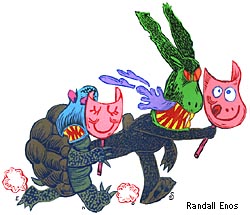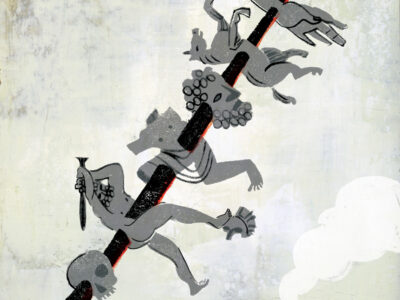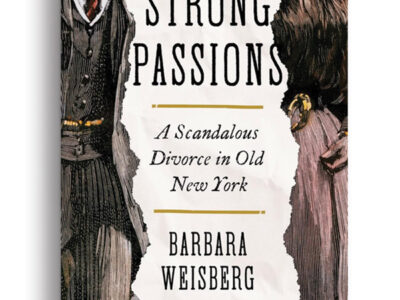
Generations of children have read the fables about the tortoise who plods his way to the finish line ahead of the arrogant hare; the mouse who repays the kindness of a captured lion; and the greedy man who kills the goose for her golden eggs. But what about the camel who defecates in a river? Or the copulating hyenas?
In retranslating an ancient text, London writers Robert, C’65, and Olivia Temple have discovered that the original Aesop fables were much bawdier, coarser — and richer with information about everyday Greek life in the sixth century B.C.E. than the sanitized and abridged Victorian versions found in today’s children’s books. Their translation, Aesop: The Complete Fables (Penguin Classics) — published in Britain in January and in the United States in February — contains 358 tales attributed to Aesop, none of which were intended for children.
Lest someone dismiss their scholarship as scatological, it’s important to note that much of the Temples’ work focused on accurately identifying the animals, birds, and plants that populate the fables and determining the precise meanings of certain Greek phrases. (It’s a ferret, not a cat, that turns into a woman in one familiar fable, for example.)
Temple, who majored in Sanskrit and what was then called “Oriental Languages” at Penn, writes in an e-mail that he and his wife initially turned to the fables because they thought they would make an entertaining television production. When they discovered how incomplete and inaccurate the existing English translations were, they decided to remedy the situation. Examining a Greek text, Temple discovered about 100 fables which had never been translated into English. “I was incredulous.”
As far as Temple is concerned, it’s fine for parents to keep the familiar versions of Aesop for their children’s bedtime reading, although he believes most of the fables in this new translation “are suitable for anyone. Personally, I think the hysterical sensitivities to [certain] Anglo-Saxon words in America is hypocritical and absurd. When
you consider the fantastic violence of American cities, and … when
one realizes that the average American teenager has vicariously
participated in 80,000 murders on television by the age of 18, to worry
about the fact that a camel shits or an ass pisses is the height of
absurdity.”
Classical scholars may dismiss Aesop “because he is too lowbrow,”
Temple says. “But I take the view that we need to know about real life,
not just philosophers in long white robes discoursing upon the ideal
state. The accurately translated Aesop fables tell us many details of
everyday life in ancient Greece which are not otherwise known. Through
the eyes of a hungry mouse we learn what Greek cooks kept in the larder.
We learn that wives often scratched and clawed the faces of their
abusive and violent husbands. We learn that dogs wore collars and men
wore wigs, and that a schoolboy could be set on the road to a life of
crime by stealing a writing tablet. We also realize that there was
little compassion shown to others, and the widespread attitude to
another’s misfortune was ‘kick him while he’s down.’ This is all very
different from fantasies about ‘the golden age of classical Greece.'”
Temple has published nine books and had a play produced at the
Royal National Theatre in London. He’s also writing a memoir about
attending Penn in the early 1960s.




